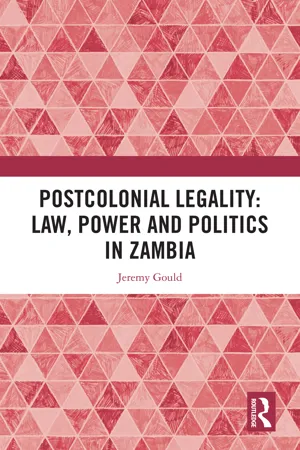
- 324 pages
- English
- ePUB (mobile friendly)
- Available on iOS & Android
Postcolonial Legality: Law, Power and Politics in Zambia
About this book
This book interrogates the ideology and practices of liberal constitutionalism in the Zambian postcolony. The analysis focuses on the residual political and governmental effects of an imperial form of power, embodied in the person of the republican president, termed here prerogativism. Through systematic, long-term ethnographic engagement with Zambian constitutionalist activists – lawyers, judges and civic leaders – the study examines how prerogativism has shaped the postcolonial political landscape and limited the possibilities of constitutional liberalism. This is revealed in the ways that repeated efforts to reform the constitution have sidelined popular participation and thus failed to address the deep divide between a small elite stratum (from which the constitutional activists are drawn) and the marginalized masses of the population. Along the way, the study documents the intimate interpenetration of political and legal action and examines how prerogativism delimits the political engagements of elite actors. Special attention is given to the reluctance of legal activists to engage with popular politics and to the conservative ethos that undermines efforts to pursue a jurisprudence of transformational constitutionalism in the findings of the Constitutional Court. The work contributes to the rising interest in applying socio-legal analysis to the statutory domain in postcolonial jurisdictions. It offers a pioneering attempt to deconstruct the amorphous and ambivalent assemblage of ideas and practices related to constitutionalism through detailed ethnographic interrogation. It will appeal to scholars, students and practitioners with an interest in theorizing challenges to political liberalism in postcolonial contexts, as well as in rethinking the methodological toolbox of socio-legal analysis.
Frequently asked questions
- Essential is ideal for learners and professionals who enjoy exploring a wide range of subjects. Access the Essential Library with 800,000+ trusted titles and best-sellers across business, personal growth, and the humanities. Includes unlimited reading time and Standard Read Aloud voice.
- Complete: Perfect for advanced learners and researchers needing full, unrestricted access. Unlock 1.4M+ books across hundreds of subjects, including academic and specialized titles. The Complete Plan also includes advanced features like Premium Read Aloud and Research Assistant.
Please note we cannot support devices running on iOS 13 and Android 7 or earlier. Learn more about using the app.
Information
Table of contents
- Cover
- Half-Title
- Title
- Copyright
- Dedication
- Contents
- Foreword
- I Preliminary issues
- II A genealogy of postcolonial power
- III Law, politics and unfettered power
- IV A new hope?
- Annexes
- Source materials
- Index